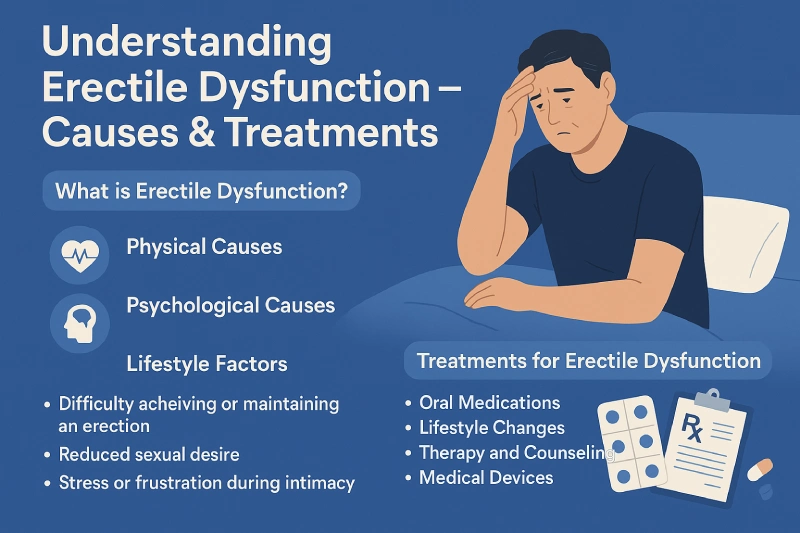
Introduction
Erectile dysfunction (ED) is a common condition that affects men of all ages, especially those over 40. It’s more than just a physical issue — it can impact confidence, relationships, and mental well-being. Understanding the root causes and available treatments is the key to taking control of your health and restoring intimacy.
What is Erectile Dysfunction?
Erectile dysfunction refers to the consistent inability to achieve or maintain an erection firm enough for satisfactory sexual intercourse. While occasional difficulty is normal, frequent episodes can signal underlying health problems that need medical attention.
Main Causes of Erectile Dysfunction
Erectile dysfunction may develop due to multiple physical, emotional, or lifestyle factors.
1. Physical Causes
- Heart and blood vessel diseases: Poor circulation can limit blood flow to the penis.
- Diabetes: Damages nerves and blood vessels that affect erection quality.
- Hormonal imbalance: Low testosterone levels reduce libido and performance.
- Certain medications: Drugs for depression or hypertension can cause ED as a side effect.
2. Psychological Causes
- Stress or anxiety: Mental strain can interrupt sexual response.
- Depression: Often linked to reduced libido and erectile issues.
- Relationship conflicts: Emotional disconnect can affect performance.
3. Lifestyle Factors
- Smoking and alcohol use: Both reduce blood flow and testosterone levels.
- Lack of exercise: Leads to poor circulation and obesity.
- Unhealthy diet: Increases risk of vascular and heart problems.
Common Symptoms of Erectile Dysfunction
Men with ED may experience:
- Difficulty achieving or maintaining an erection
- Reduced sexual desire
- Stress or frustration during intimacy
- Relationship tension
If these symptoms persist, professional diagnosis is recommended to identify underlying causes.
Proven Treatments for Erectile Dysfunction
Thankfully, erectile dysfunction is highly treatable. Depending on the cause, treatment may include one or more of the following:
1. Oral Medications
Drugs such as Viagra (Sildenafil), Cialis (Tadalafil), or Levitra (Vardenafil) improve blood flow to the penis.
2. Lifestyle Modifications
Adopting a balanced diet, regular physical activity, quitting smoking, and reducing alcohol intake can greatly improve erectile function.
3. Psychological Therapy
If emotional or mental factors are the root cause, therapy or counseling can help relieve performance anxiety or depression.
4. Medical Procedures
Options like vacuum erection devices or penile implants may be recommended for severe cases.
5. Hormone Therapy
If low testosterone is detected, hormone replacement therapy can help restore normal sexual performance.
When to Seek Medical Help
Persistent erectile dysfunction should not be ignored. It can be an early warning sign of heart disease, diabetes, or hypertension. Consulting a healthcare professional ensures timely diagnosis and effective management.
Final Thoughts
Erectile dysfunction is a common condition, but it doesn’t define you. With the right combination of medical care, lifestyle changes, and open communication, men can successfully overcome ED and enjoy a healthier, more fulfilling life.
Taking the first step — seeking help — can make all the difference.
